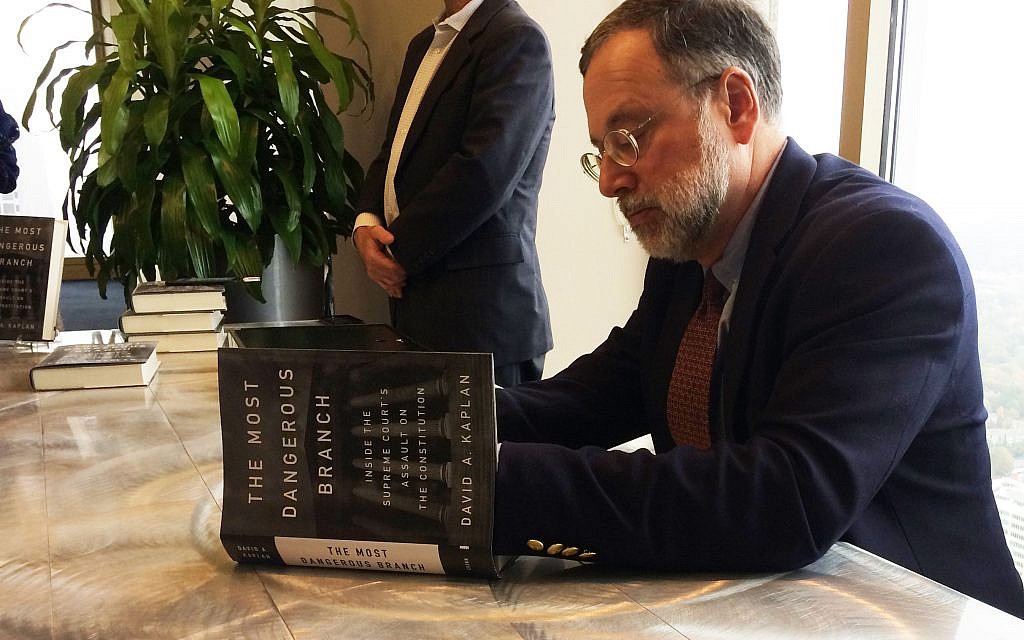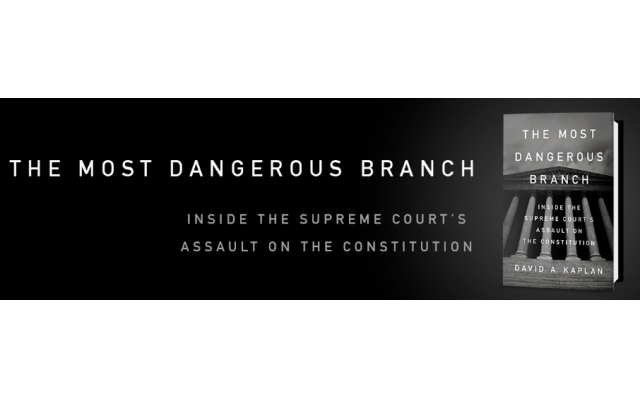Kaplan’s Book Takes on Supreme Court
“Liberals and conservative alike blithely rely on the court to settle society’s toughest issues – at the expense of the two branches of government ... designed to be democratic.”
David Kaplan’s new book, “The Most Dangerous Branch: Inside the Supreme Court’s Assault on the Constitution,” reached bookseller’s shelves with almost perfect timing earlier this year.
It was published on Sept. 4, the first day of the contentious hearings into the nomination of Brett Kavanaugh, to be the next Supreme Court justice. Its arrival was just in time to join the debate, which has been raging over the past several decades, on the proper role of the Court.
Kaplan believes, as he puts it in his book, that “liberals and conservative alike blithely rely on the court to settle society’s toughest issues – at the expense of the two branches of government that are designed to be democratic.”
The result is the same whether the issue is a liberal one, Roe v. Wade, the 1973 decision legalizing abortion, or a 2000 decision that rewarded conservatives, Bush v. Gore, which made George W. Bush the 43rd president of the United States.
Faced with a Congress that is often unable or unwilling to act, we turn, he believes, to a group of Supreme Court judges with a lifetime appointment, who answer to no one but themselves and who, in effect, make the law.
With a law degree from New York University, Kaplan is a longtime observer of the workings of the Supreme Court. Previously, he wrote “The Accidental President” about the Bush-Gore election dispute on which the Emmy-winning 2008 HBO feature film, “Recount,” was based.
He worked more than 25 years for national news magazines, including 20 years at Newsweek, where he was the legal affairs editor and wrote lengthy profiles on Supreme Court Justices Clarence Thomas and William Brennan. In addition to his career as an author, he is an adjunct professor at NYU, where he teaches about journalism and ethics.
His great-grandfather, Adolph Bergida, was a founder of New York City’s Federation of Jewish Philanthropies, a forerunner of the United Jewish Appeal.

At a Nov. 15 Atlanta Press Club talk, Kaplan laid out his case that the Court in recent years has decided social issues best left to the legislative process, and has done so with a vengeance.
“In truth, all the talk about judicial restraint is nonsense,” he told the Press Club. “In truth, everybody’s a judicial activist now. It just depends on which cases. Judicial activism is what the other guy does.”
Last week’s hostile exchange between the president and Chief Justice John Roberts is yet another sign that the courts are becoming an even more contentious political battleground.
With the recent appointment of conservatives such as Neil Gorsuch and Kavanaugh, and a clear conservative majority on the Court, he believes we are likely to see even more judicial activism.
“I think you’re going to see an aggressiveness from this court that we have not seen from the conservatives in a generation. And of course,” he emphasized, “the irony is that it’s conservatives who’ve been screaming for a generation or longer about liberals not being able to achieve victories in the Congress and in state legislatures, and rushing to the court to win those rights.”
There is already talk of challenging the power of the Supreme Court.
A report last Sunday in The Huffington Post, a website with strong liberal credentials, describes recent thinking that would propose 18-year term limits or that would increase the number of liberal justices by “packing” the Court, as President Franklin D. Roosevelt attempted to do in 1937.
Neither idea is new, but as the Court increasingly wades into the political arena, there are likely to be attempts to limit its power.
Anything seems possible in this newly-found awareness of the power of the Supreme Court, but Kaplan’s thoughts are more modest.
“I think the most realistic hope for the court,” he says, “is that it reins itself in for its own good.”




comments